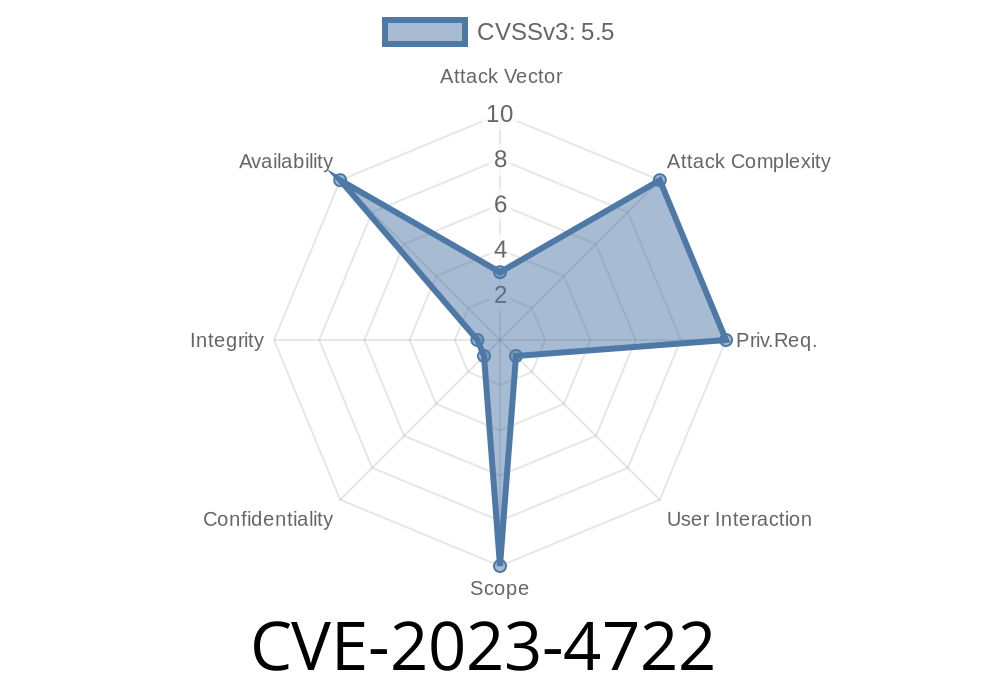GPAC is a popular open source multimedia framework, widely used for processing and streaming video files. If you or your team use media tools built on the GPAC library, you should pay special attention to CVE-2023-4722. This vulnerability involves an *Integer Overflow or Wraparound* in the GPAC codebase, affecting all versions before 2.3-DEV, and can be exploited to crash applications or even execute arbitrary code.
In this post, I’ll explain what this bug is, show sample code, tell you how an attacker could use it, and provide official references for more information.
1. What Is CVE-2023-4722?
CVE-2023-4722 is an *Integer Overflow or Wraparound* bug found in the gpac/gpac repository (before version 2.3-DEV). GPAC is widely used for manipulating multimedia files (MP4/MPEG-4, etc.), and this bug specifically affects its internal processing of media data.
Technical Summary
Integer overflow errors happen when arithmetic operations exceed the size limits of integer types, wrapping around and producing unexpected results. If an application trusts these wrapped values—especially for memory allocation or array indexing—it can result in buffer overflows, crashes, or, in the worst cases, arbitrary code execution.
In GPAC, an attacker can craft a malicious media file that triggers the overflow, causing the affected application (e.g., mp4box or other tools using GPAC) to misallocate memory and possibly run malicious code.
2. Sample Vulnerable Code (Before the Fix)
While the exact vulnerable code may differ by version, here’s a simplified snippet inspired by the GPAC codebase to illustrate how this kind of bug might look:
// This is example code, not directly from GPAC!
uint32_t sample_count = read_32bits(input_file);
uint32_t buffer_size = sample_count * sizeof(SampleEntry);
// Potential overflow if sample_count is too large!
SampleEntry *samples = malloc(buffer_size);
if (!samples) {
// handle allocation failure
}
Explanation
- If the attacker sets sample_count to a very large value, the calculation for buffer_size can overflow.
- On a 32-bit system, UINT32_MAX * sizeof(SampleEntry) wraps around, turning a huge sample_count into a small buffer_size.
- Memory is allocated for only a small buffer, but later code might write up to sample_count entries, spilling into adjacent memory: buffer overflow!
Minimal PoC (Proof of Concept)
You can often trigger such bugs just by providing a file with a large value in a crucial metadata field.
# Python snippet to build a malicious file (conceptual)
with open("malicious.mp4", "wb") as f:
f.write(b"\x00\x00\x00\x01" * 10000000) # Overly large sample count
If you run a vulnerable version of GPAC’s tools against this file
mp4box -info malicious.mp4
# => Crash or heap corruption
Note: Real attacks would be more precise and may use fuzzers to detect exactly which field and structure causes the overflow.
4. Official References
- CVE Details – CVE-2023-4722
- GitHub Advisory GHSA-9rm8-2g63-52hf
- gpac/gpac: commit fixing the issue
Affected versions: All versions *before* 2.3-DEV
Patched in: 2.3-DEV (and later)
Update! Always use the latest version of GPAC (2.3-DEV or newer).
- If maintaining your own code based on GPAC, audit any area where integer math is used for memory allocations or array limits.
*Example defensive code:*
if (sample_count > MAX_ALLOWED || buffer_size / sizeof(SampleEntry) != sample_count) {
// invalid or suspicious input, abort
}
6. Conclusion
CVE-2023-4722 is a classic example of a critical integer overflow bug with severe consequences for applications processing untrusted media files. All users of GPAC prior to 2.3-DEV should update immediately and review any tools or pipelines based on GPAC. Attackers can leverage this bug by crafting media files with corrupt metadata, crashing systems or possibly running their code.
For more details, check the official GitHub advisory and NVD entry.
Stay safe! Always validate integers and never trust file metadata blindly.
Timeline
Published on: 09/01/2023 16:15:00 UTC
Last modified on: 09/06/2023 00:15:00 UTC
